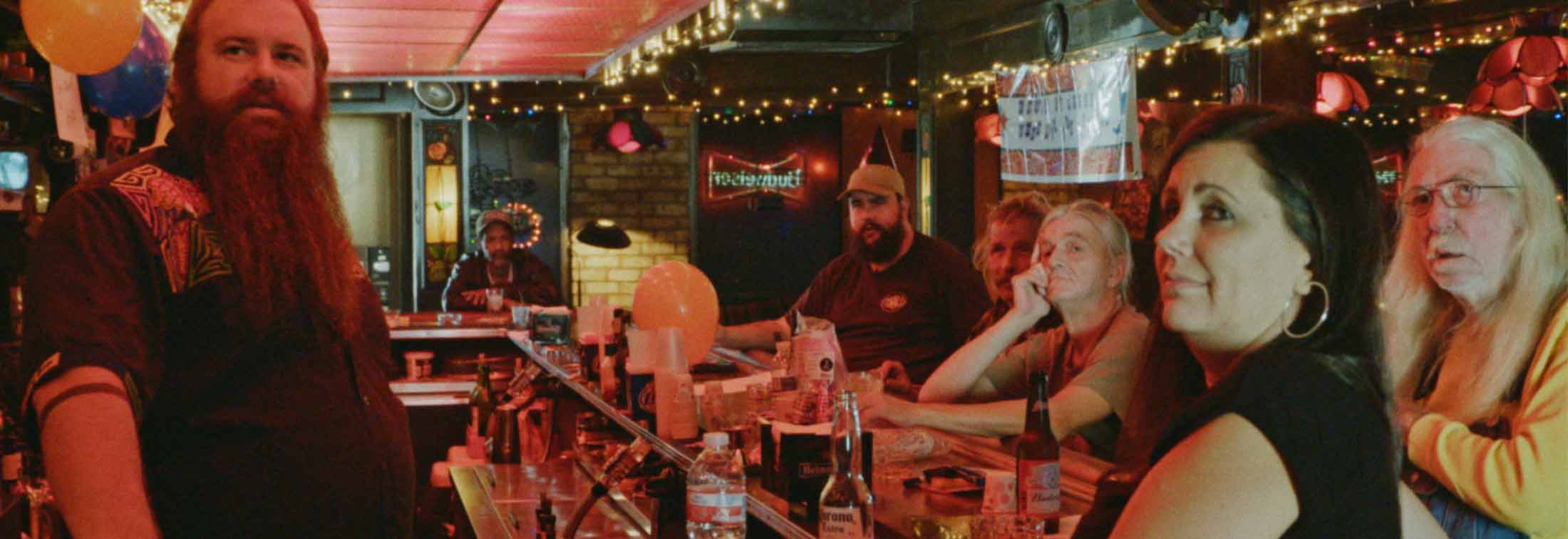
Dozens and dozens of documentaries hit theatres every year, and few are ever subjected to any kind of serious scrutiny about their authenticity. Every once in a while, however, a supposedly non-fiction film weathers charges of fraudulence - and not in the Herzogian oh-we-restaged-a-conversation-or-two kind of way, but in the James Frey or Stephen Glass we-just-made-this-shit-up kind of way. For example, 'Catfish' seemed to be neither based on nor inspired by true events, but suggested a capturing of the fickle deeper truth of emotional experience over objective fact. I got some hate mail for giving a good review to 'The Eagle Huntress', which allegedly staged some sequences. This goes all the way back to the first documentary feature ever made, 'Nanook of the North', which is regarded as a classic, and was almost completely faked. What kind of documentary is Bill and Turner Ross' 'Bloody Nose, Empty Pockets'?
The film presents itself as a chronicle of a Las Vegas dive called Roaring '20s, with its abundance of regulars getting riled and teary in the face of its closure. It looks like any small neighbourhood watering hole, but there's a twist (of sorts): the bar isn't real, and the movie was shot in New Orleans with locals who were brought in to play variations of themselves. That might sound disingenuous, but it ends up making for an infinitely more interesting film.
'BLOODY NOSE, EMPTY POCKETS' TRAILER
The clientele of Roaring '20s consists of a group of regulars. Word of the bar's closing has gotten around, so only the usual costumers know the place is still open. They definitely know the party is about to end. We meet these people as they enter the bar throughout the day, stay as long as they're willing or able, and leave with various degrees of notability. Especially in these post-COVID times, there's something oddly captivating about watching these unremarkable people converse in unremarkable ways. Hal Holbrook-lookalike Michael is essentially the film's "protagonist", a real-life stage actor who practically says as much late in the narrative. Michael wakes up with his head on the bar, and Marc, the helpful and cheery bartender, pours this constant customer a bourbon.
Then there's Bruce, the quiet and lonely veteran who sits at the end of the bar, chiming in with words of wisdom every now and then. "A heap see, but a few know," is his catchphrase. Everyone is prepared for trouble when Pam enters, working her way toward getting louder and more confrontational as the night progresses. But she's just looking for companionship, too. "Some good company, some wine... it's Thanksgiving every day", she remarks. Marc's shift ends, and Shay, also keeping tabs on her teenage son outside, takes over as peacekeeper.
It's a welcoming, intimate environment. All of these everyday people come together, because they instinctively know everyone at this place is feeling a similar way. There are arguments, obviously, and some people are hiding much pain and suffering. Most noticeably Michael, whose daytime loquaciousness transforms into a night of quiet reflection. He later confides in a musician of his own resentment and regret, if only to get the younger guy to understand that he needs to get out of this cycle now.
The Ross brothers even sprinkle their films with cinematic references, with John Huston's 'The Misfits' playing on TV and another character mentioning Eugene O'Neill's play 'Long Day's Journey into Night'.
There are many first-time actors - it feels rude to call them non-actors - with vital, vivid roles in 'Bloody Nose, Empty Pockets', many of them playing characters, but all of them selected to just be themselves. The lines between person and performance aren't so much blurred in the movie as they are woven. The result is hyper-realistic and surreal, warping one's perspective, like focusing too long on a word or staring too hard into a diamond.
If there are any other inspirations that came to the Ross brothers, I imagine they might have been Robert Altman or John Cassavetes, who were famous for overlapping dialogue and real people with their cameras in such a way as to enhance our own experience, in films like 'Nashville' and 'The Killing of a Chinese Bookie'. It's a technique that the Safdie brothers have used to great effect in their own films, 'Good Time' and 'Uncut Gems'. The Ross brothers even sprinkle their movie with winking references, with John Huston's 'The Misfits' playing on TV and another character mentioning Eugene O'Neill's play 'Long Day's Journey into Night'.
Yes, the world is technically reopening, but the threat of COVID-19 is still keeping many from relaxing into their local saloons as they once did. Dive bars are an essential part of the American experience, but under pandemic guidelines, they're not an essential business. No one can visit dives right now. Not the people who need them, not the people who love them, not the people who can't stay out of them and can't say why.
'Bloody Nose, Empty Pockets' is many things: a portrait of a dying Americana, a chance to air-lick the salt of the earth, a Depression-era David Lynch movie, a tour through a monastery to which broken people retreat to mumble the secrets of existence, poetry slams delivered with bleary eyes and slumped shoulders, sharing a lot of things that were occasionally true but more often than not, not. It's a fascinating film.